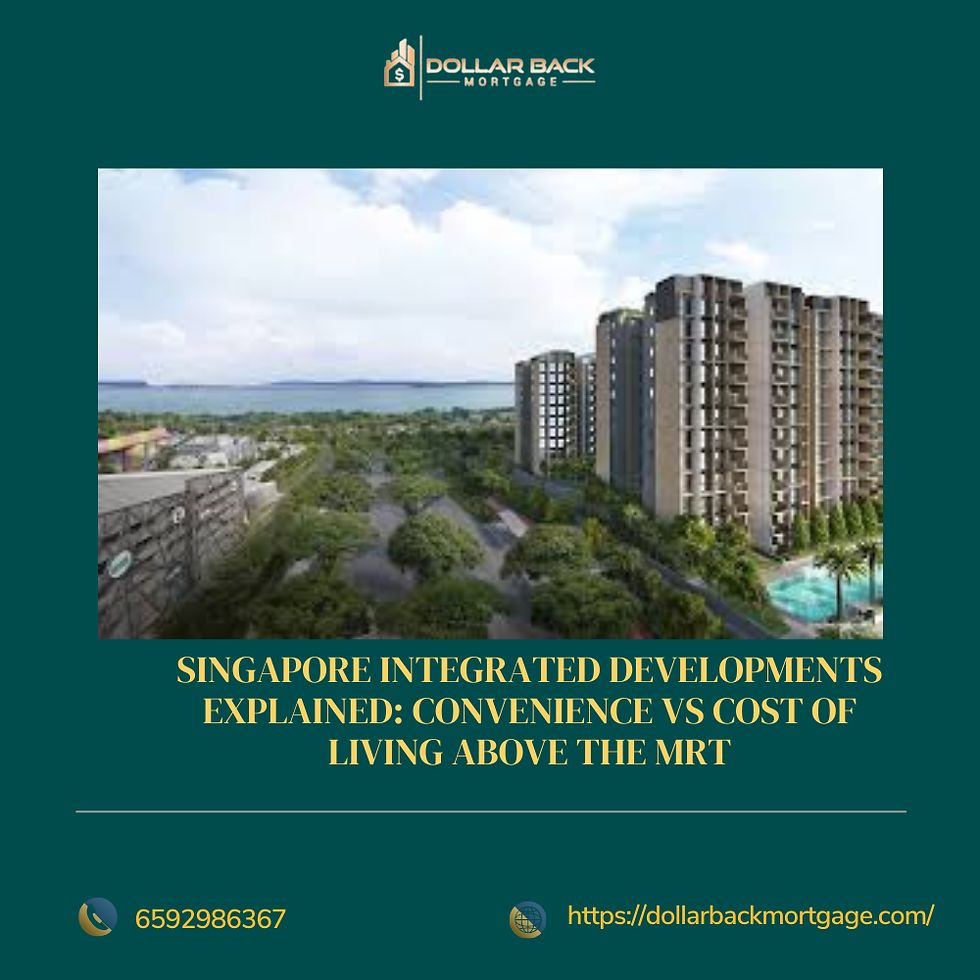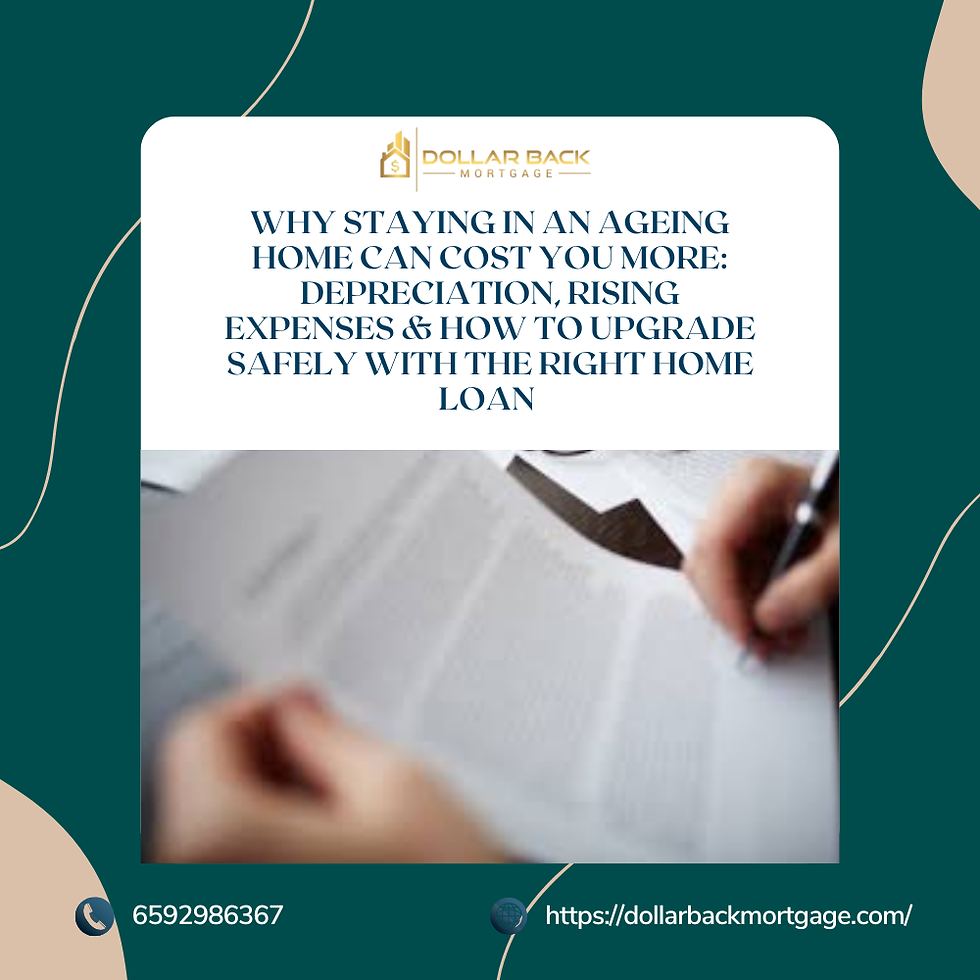How Trump’s Policies Impact Singapore’s Property Market
- mortgagedollarback singapore
- Mar 26, 2025
- 4 min read
The return of Donald Trump to the White House has sparked a renewed wave of speculation—not just across Washington, but globally. In Singapore, one sector watching closely is real estate. Though seemingly distant from American politics, the Singapore property market is intricately linked to global trends, particularly U.S. economic strategies.
Trump’s policies—ranging from trade tariffs to interest rate pressure—have the potential to shift capital flows, disrupt borrowing costs, and influence investment strategies in Asia. Here’s a deep dive into how these changes may ripple through Singapore’s residential and commercial property landscape.
How do US policies and tariffs impact Singapore’s property market? Discover the effects on condo prices, investment trends, and market stability in this insightful analysis.

Protectionist Trade Moves Could Reshape Capital Inflows
At the heart of Trump’s economic agenda is protectionism. Should new tariffs escalate tensions between the U.S. and China, global supply chains could be disrupted again. As seen in previous trade conflicts, when Chinese investors face domestic uncertainty, Singapore often becomes a preferred destination for capital flight.
That trend, however, may look different in 2025. The ABSD rates for foreigners in Singapore—now at 60%—are among the world’s highest. While ultra-high-net-worth individuals may absorb this cost for the sake of stability, the average foreign investor may be deterred.
Chinese capital inflows may now be more selective, targeting luxury units in the Core Central Region (CCR) rather than flooding all market tiers. Still, any escalation in the U.S.-China conflict could nudge foreign capital towards Singapore’s “safe haven” status, sustaining pressure on property prices in Singapore.
Why Americans May Gain Ground in Singapore’s Market
Interestingly, under the U.S.-Singapore Free Trade Agreement, American citizens are exempt from the steep ABSD rates for foreigners in Singapore. They pay the same buyer’s stamp duty rates as locals—opening the door for U.S. investors to tap into the Singapore market at a discount relative to other foreigners.
If instability rises in the U.S. domestic real estate sector, more Americans may shift their attention to Singapore’s stable and well-regulated property market. This unique advantage could subtly reshape buyer demographics in prime areas.
The Real Interest Rate Domino Effect
Beyond trade, monetary policy is where Trump’s second term could leave a more direct mark. He has historically pressured the U.S. Federal Reserve to lower rates. If this trend continues, the impact will trickle across the globe, including Singapore.
Singapore’s housing loan rate is largely influenced by global interest movements, especially those in the U.S. If the Fed adopts a looser monetary policy under Trump, Singapore’s interest rates for home loans—which often peg to the Singapore Overnight Rate Average (SORA)—may follow suit.
For Singaporean buyers, lower mortgage loan interest rates would ease monthly repayments and improve affordability. A drop in the property loan interest rate could trigger renewed activity, particularly in the mid-tier and suburban markets where affordability remains a concern.
However, there’s a flip side.
If Trump’s trade moves fuel inflation—as tariffs often do—the Federal Reserve may have to keep rates higher for longer. That would mean continued pressure on borrowing costs, keeping Singapore housing loan interest rates elevated. For buyers relying on debt, this would restrict purchasing power and slow down transaction volumes.
Volatile Rates Could Challenge Both Homebuyers and Investors
For now, Singapore’s property players must prepare for both scenarios. On one hand, softening interest rates for home loans could open a window of opportunity for first-time buyers or upgraders. On the other, uncertainty in U.S. monetary policy could fuel rate volatility, complicating decisions for those eyeing long-term mortgage commitments.
Choosing between fixed and floating loan packages becomes more crucial. If rates appear poised to fall, floating options might offer better savings. But in an unpredictable global climate, locking in a stable housing loan rate in Singapore could offer valuable peace of mind.
Commercial Real Estate: Facing a Different Storm
While residential markets respond to individual borrowing power, commercial properties are deeply linked to business expansion and trade flows. Here, Trump’s policies may bring more turbulence than opportunity.
An intensification of U.S.-China tensions could prompt multinational companies to rethink their regional strategies. Higher operating costs, logistics disruptions, and shifting supply chains may see some businesses downsize or delay expansion into Southeast Asia.
This could hurt demand for office spaces in Singapore’s Central Business District (CBD), leading to increased vacancies or downward pressure on rental yields. Investors holding commercial assets may struggle to meet rising mortgage loan interest rates if rental income softens.
Logistics and Industrial Properties Might Buck the Trend
However, not all commercial sectors are vulnerable. If firms diversify supply chains away from China, Singapore’s strategic location could strengthen its appeal as a logistics hub. Warehousing, light industrial properties, and data centres could see increased demand.
These assets may offer resilience even if overall property prices in Singapore plateau, making them attractive to investors seeking stable yields amidst policy uncertainty.
What Should Buyers and Investors Do in 2025?
Given the possible swings in interest rates and trade dynamics, should Singapore property investors buy, hold, or wait?
Those with holding power and long-term vision may find strategic buys in sectors resilient to global shocks. Luxury units, logistics spaces, or even shophouses in mature districts could deliver capital appreciation over time. And if the Singapore property market tariffs environment intensifies, stability-seeking foreign capital may continue to support prime real estate values.
But short-term speculators should tread carefully. If property loan interest rates stay high or inch up further, refinancing risk and carrying costs could erode returns. Moreover, any new property cooling measures introduced to counter sudden foreign inflows may catch some off guard.
Final Thoughts
Trump’s presidency may feel far removed from Singapore’s property scene, but its ripple effects are real. Whether it’s tariffs pushing investors across borders, or interest rate policies dictating mortgage terms, the interlinkage between U.S. decisions and local real estate grows tighter by the year.
Trump’s second term could reshape Singapore’s property market—impacting tariffs, ABSD rates, mortgage loan interest rates, and foreign investor demand.
For now, the Singapore market remains fundamentally strong. But homeowners, developers, and investors would do well to keep an eye on Washington as much as they do on the URA.
Because when the winds shift in D.C., the property papers in Singapore may not stay untouched.




Comments